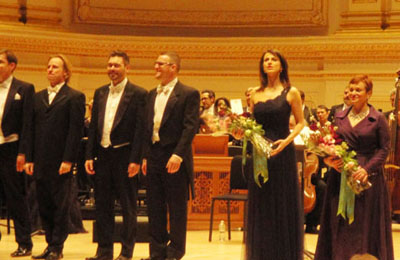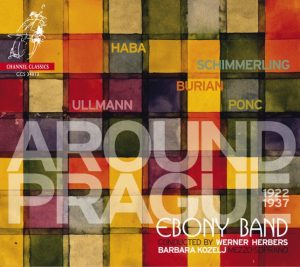Bartok "Deep humanity in the opera Bluebeard's castle"
role: Judith NJO & Antony Hermus
"In raw industrial heritage, the old Milk Factory in Arnhem, the NJO presents a strong production of Béla Bartók's opera Blauwbaards burcht. Singers Barbara Kozelj and Marc Pantus are amazing soloists.
Bartók's wonderfully rich music is both enchantingly evocative and almost unbearably explicit – you can see the shrill sounded blood in front of you. The young orchestra played excellently under Antony Hermus, who like no other can forge a collective that is more than the sum of its parts. The bearers of the performance were nevertheless the two amazing soloists, the clear-warm mezzo Barbara Kozelj and the flexible baritone Marc Pantus. Their voices colored beautifully and with their deeply engaged playing they brought the characters to life. In Kenza Koutchoukali's detailed direction of characters, their love was above all tragic and a deep humanity shimmered through the extraordinary circumstances."
Joep Stapel, NR
Wagner22 at Leipzig oper Tristan und Isolde
role: BRANGÄNE
"Kurzfristig eingesprungen.... ist Barbara Kozelj als Brangäne. Sie singt die Partie nicht nur großartig mit ihrem sehr charakteristischen vielfarbigen Mezzo, sie gibt Isoldes Vertrauter auch szenisch tragische Größe mit."
"Barbara Kozelj as Brangäne stepped in at short notice.... Not only does she sing the role superbly with her very characteristic, multicolored mezzo, she also lends Isolde's confidante tragic grandeur to the scene."
Leipziger Volkszeitung
"Die Brangäne der Premiere von 2019, die Slowenin Barbara Kozelj, sang wieder eine klang- und ausdrucksvolle Brangäne bei großer Agilität."
"The Brangäne, Slovenian mezzosoprano Barbara Kozelj, who also sang the premiere in 2019, once again sang a sonorous and expressive Brangäne with great agility."
Online Merker, Klaus Billand
"Beeindrukkend sind die sehr präsente, jugendlich frische Brangäne von Barbara Kozelj und der der kraftvoll zupackende Kurwenall von Mathias Hausmann."
"Impressive were Barbara Kozelj's very present, youthfully fresh Brangäne and Mathias Hausmann's powerfully gripping Kurwenall."
Online Musik Magazin, Stefan Schmöe
Song recital with Nikki Treurniet and Thomas Beijer
International Lied Festival Zeist
"Heart and head bloom as the modern world disappears."
●●●●● (5 star review!)
NRC Handelsblad, Joost Galema
"At the Liedfestival in Zeist one can feel what it was like to yearn for love and to mirror unfulfilled desires to nature. A recital by Nikki Treurniet and Barbara Kozelj made us completely forget the modern world.
For a week and a half, Zeist - as every year - celebrates the high mass of the art of song, the intimate mixture of poetry and piano. It is a genre that is under pressure, because it requires a form of literacy and imagination that is no longer self-evident. Nevertheless, there are those evenings, such as Wednesday, when enchantment reigns and two singers and a pianist take you breathlessly to a 'lost' world, in which nature was the mirror of the human emotional life.
Where nowadays we can pull our beloved out of our pockets for some facetime, composer Robert Schumann imagined that he was a bird to fly to his beloved.
The modern world disappeared completely behind the horizon for an hour and a half on Wednesday in the recital by soprano Nikki Treurniet, mezzo Barbara Kozelj and pianist Thomas Beijer. The trio brought a time of indefinable desires to life that are imprisoned in a corset of impatience: lovers cannot reach each other at the push of a button, but are condemned to an existence in their own heart and head. The seasons symbolize waiting, flowering or chilling; the dark forest and the sea as the mystery; the rose as virginity (and woe to him who plucks her); the raindrop as the tear – man is still in the middle of nature's cycle.
Treurniet and Kozelj sang – together and solo – in picturesque terms of light and dark and numerous intermediate colors. You heard in their voices the sun in all its hues, from morning to evening, as well as the twilight and the nightly dream. Pianist Thomas Beijer added his own voice to the narration via the grand piano. “You will bloom colorfully”, sang both singers in the closing song Grüne, du Gras! from Dvorak. The song in bloom, that pretty much summed up the evening."
Claude Vivier: Wo bist du, Licht?
ZaterdagMatinne Concertgebouw Amsterdam Asko-Schönberg ensemble / Bas Wiegers
●●●●● (5 star review!)
“Wo bist du, Licht!" was thrillingly beautiful, especially due to the fantastic singing of Barbara Kozelj. Wiegers started this piece magnificently, with scratches from the strings, always cleaving with huge slaps on the big drum. Hallucinating.”
TROUW, Peter van der Lint
●●●●● (5 star review!)
“Deafening, toneless noise underlined the hopelessness in ‘Wo bist du, Licht !’ until the powerful mezzo of Barbara Kozelj blossomed and drove the darkness away."
NRC, Joep Stapel
Richard Wagner Tristan und Isolde
role: Brangäne Athens State Orchestra / Stefanos Tsialis/ Megaron hall Athens allongside Petra Lang as Isolde and Stefan Vinke as Tristan
“Daneben konnten auch Barbara Kozelj als Brangäne und James Moellenhoff als König Marke starke Akzente setzen. Bei Kozelj beeindruckte ihr klangschöner, sicher gefuehrter Mezzosopran, bei Moellenhoff durfte man sich an seiner gut gestalteten Klangrede erfreuen.”
“Barbara Kozelj as Brangäne and James Moellenhoff as King Marke were also able to set strong accents. Kozelj impressed with her beautifully sounding and steadily delivered mezzo-soprano, and with Moellenhoff you could enjoy his well-designed sound speech.”
Klaus Billand, Onlinemerker
Richard Wagner Tristan und Isolde
role: Brangäne Oper Leipzig / Gewandhausorchester / Ulf Schirmer / Enrico Lübbe
"Brangäne und Marke…so hätte der Titel des Werkes lauten müssen, wenn es nach den besten Sängerleistungen dieser Neuproduktion zu urteilen gälte!
Als Brangäne begeisterte hingegen Barbara Kozelj mit klangstarkem, sauber intoniertem Mezzosopran. Engagiert im Spiel war sie ein deutlicher Aktivposten. Selten ist die Anteilnahme, die szenische Interaktion in dieser Rolle derart glaubhaft und gekonnt zu erleben. Sauber in der Intonation erklangen die „Wacht“-Gesänge. Dazu erlebte sie den Text deutlich und intensiv, dass es eine Freude war. Eine ausgezeichnete Leistung!"
Onlinemerker.com Dirk Schauss
“….unterbrochen von den warnenden, gehaltvoll intonierten Rufen der Brangäne von Barbara Kozelj. Frau Kozelj begeisterte rundweg mit ihrer vokalen Interpretation dieser wichtigen Rolle. Ihre Stimme ist eher hell gefärbt, derjenigen der Isolde im Timbre sehr ähnlich. Sie verfügt über ein beeindruckendes Volumen und beglückte (wie eigentlich alle Protagonisten) mit ihrer klaren Diktion und subtiler Phrasierung".
Oper Aktuell, Kaspar Sannemann
"So klangschön wie die Isolde wirkte auf mich auch die Brangäne von Barbara Kozelj, die aus Slowenien stammt und mit ihrem dunklen Timbre jeder Situation gewachsen schien."
MDR Kultur, Michael Ernst
"Die Mezzosopranistin Barbara Kozelj aus Slowenien war als die Stimme der Vernunft als Brangäne eine ideale Partnerin der Isolde auf Augenhöhe. Stmmlich mit Meagan Miller gut abgestimmt, bietet sie dank ihrer starken Präsenz ein echtes Erlebnis."
IOCO Kultur am Netz
"Zu einer Rolle, gewichtiger als Kurwenal und Marke, wird in dieser Inszenierung die Brangäne. Barbara Kozelj singt sie, ihr Timbre ist Millers Isolde etwas ähnlich. Dass Kozeljs Brangäne im ersten Akt stimmlich von einer größeren Unruhe getrieben scheint als Isolde, passt durchaus. Denn sehr deutlich ist hier eine Art Liebesbeziehung wahrzunehmen – und Brangänes verzweifeltes Bewusstsein, dass diese Liebe zerbrechen wird. Und so wirkt ihr Verlust am Ende der Oper schmerzlich wie kaum je."
Hundert11.net,
"Bei den Sängern möchte ich mit denen beginnen, die mich besonders beeindruckten. Das ist als erste die Slowenin Barbara Kozelj, die mit der Brangäne ihr Rollendebut gab. Sie verfügt über einen charaktervollen leuchtenden Mezzo und scheint auch mit ihren darstellerischen Qualitäten eine erstklassige Besetzung für die Warnerin Isoldes zu sein. Herrlich auch ihre entsprechenden Rufe im 2. Aufzug, bei denen sie auch sichtbar war."
Opera online, Klaus Billand
"Barbara Kozelj ist ein jugendlich schwereloser Wagner-Mezzosopran, der eine wohlige Wärme auch in den tiefen Lagen verbreitet. Sie vermag zu explodieren, wächst mit dem dynamischen Crescendo über sich hinaus."
Oliver Hohlback, Operapoint.
"Als Brangäne ist Barbara Kozelj eine mit viel Vernunft denkende Mahnerin, die Isolde eher mit vollstimmig klar klingenden Ansagen als mit warm flehenden Bitten zur Seite steht. Eine spannende Interpretation dieser Partie."
Online Music Magazine, Berndt Stopka
"Barbara Kozelj, die junge Mezzosopranistin in der Partie der Brangäne…in dem berühmten Wachgesangschweb te ihre Stimme mit perfektem Legato durch das Haus."
Artvisionandmidou.wordpress.com
Vivaldi-Moretto Dangerous liaisons
role: Madame de Tourvel Opera 2day / The Netherlands Bach Society / Hernan Schwartzmann / Serge van Veggel March 2019
"The strongest link of the show is mezzo-soprano Barbara Kozelj (Tourvel). Her acting is mesmerizingly restrained, she sings fantastic and makes you, for a moment, truly feel sorry for her fall for cunning temptation.
NRC, Micha Spel
"Singing with a velvety legato, mezzo-soprano Barbara Kozelj as Madame de Tourvel made her every appearance an event, including the favorite “Sposa, son disprezzata”, filched by Vivaldi from Geminiano Giacomelli. In the pit, the Netherlands Bach Society under Hernán Schvartzman were limber and expressive and gave one of the best musical performances of the evening.
...more great vocal stuff was called for, such as when Cécile and Madame de Tourvel both retreat to convents, the former to take the veil and the latter as a mental patient. Their lonely cries rose forlornly out of the darkness in the echo aria “L’ombre, l’aure e ancora il rio” from Ottone in villa—piercingly beautiful.
OperaToday, Jenny Camilleri
"The deep and powerful heartfelt voice of the Presidente de Tourvel (Barbara Kozelj) remains with the audience for a long time."
Trouw, Frederieke Berntsen
"Danceny’s duet with Cécile takes your breath away, as does the singing of Madame de Tourvel (Barbara Kozelj), so beautifully coloured by emotions.
8weekly, Kim Saris

Song recital with Julius Drake
concertgebouw Amsterdam April 2019
"We'd better keep the Slovenian mezzo-soprano Barbara Kozelj in the Netherlands, it turned out at the Concertgebouw Amsterdam."
★★★★
"This is not just a song recital at the Kleine Zaal of the Amsterdam Concertgebouw by a singer and recital-artist together with the renowned accompanist Julius Drake at the piano. This is a song recital in which the singer was completelly in her role before she has even sung a note. A warm voice. A constant: she keeps her tone straighter in the lower part of her voice and sings with more vibrato in the height. She intonates expressively in Korngolds' Sterbelied. And once in a while she reveals such a well-aimed vocal outburst that we instantlty understand that she can also handle concert halls ten times this size."
"Fantastic how she lures you into the night in Berg's Warm die Lüfte and lets you reconcile with the darkness. That little bow in her voice, that final note. Tiefschön."
"In the second half, when she has exchanged her black dress for a more lush mint green one, there is a clear winner. The naive song settings of Joaquín Rodrigo (those of the guitar concerts) are not equal to those of Enrique Granados. In La maja dolorosa one, two and three, the mouths of the audience fall open..."
Volkskrant, Merlijn Kerkhof
Ebony Quartet Unheard
Songs of Hans Walter Süsskind CD review
"Die Singstimme wächst aus dem Streichquartettklang heraus, erscheint eingeschmolzen in ihn als fünfte Stimme. Dem wird die wundervoll
instrumental geführte Mezzosopranstimme von Barbara Kozelj voll gerecht. Schwebendes Schreiten durchwirkt das zweite Lied ,,Heimweg", zu extremer Lage erhebt sich das dritte Lied ,,Die Geliebte", und das Schlusslied ,,Der Sterbliche" entfaltet sich von majestätischem Unisono zu tippig bliihendem Klang.
Musica Reanimata, Gottfried Eberle
"...sublime singing by Barbara Kozelj (how expressive her interpretation!) in four songs of Hans Walther Süsskind: Zauber bei Tag, Heimweg, Der Geliebte en Der Sterbliche."
Aart van de Wal, Opus Klassiek
"Barbara Kozelj creats a perfect atmosphere in Süsskinds Vier Gesänge..."
Volkskrant, Biëlla Luttmer
Monteverdi Il ritorno d'Ulisse in Patria
Academy of Ancient Music / Richard Egarr / Barbican Hall, London
"The vocal star of the show was Barbara Kozelj’ s Penelope. This was a noble, dependable portrayal, in which her mellow and controlled singing sounded like a contralto at times, giving natural and soulful expression to the character’ s suffering patience. She is certainly a singer to watch in the future." - Classical Source, Curtis Rogers
“Barbara Kozelj in the role of Penelope set the bar high with her Act One lament. Her voice freighted with the grief of the passing years, it articulated her numbed sorrow with the subtlest of nuances. A pair of delicately plucked theorboes complemented her plangent declamation to perfection.” - Evening Standard, Barry Millington
“Barbara Kozelj was similarly grounded in her performance, giving us a lovely sense of Penelope's patience and the sense of being cut off and walled in by her emotions. But also, stretched thin, this was someone who might break. Kozelj had a beautifully calm demeanour, combined with a deep expressivity in the way she sang the Monteverdi.” - Planet Hugill, Robert Hugill
“....I was won over by Kozelj’ s nuanced singing. Lots of floated notes and delicate inflections – a rather internalised grief, very stylish. Pivotal moments, such as Penelope’ s idea –implemented by Minerva – to challenge the suitors to stringing Ulisse’ s bow or her meeting with Ulisse where she is obviously attracted to him but isn’ t sure of his identity yet, came off very clearly. And this time both Penelope and Ulisse looked genuinely happy to meet again.” - Opera, Innit
“Barbara Kozelj as Penelope had a more direct voice, but its clarity was matched by equal levels of sensitivity and feeling, and her final reconciliation with Ulisse was deeply moving.” - Music OMH, Sam Smith
“Barbara Kozelj’ s melancholy Penelope was the still centre of the opera, fending off the importunate suitors. “ - Express.co.uk, Clare Colvin
Bach Matthäus-Passion
Orchestra of St Luke’s / Iván Fischer / Carnegie Hall New York
 "Most to be praised was mezzo Barbara Kozelj whose expressive rounded voice filled the hall, particularly so in “Buss und Reu.” - Seen and Heard International
"Most to be praised was mezzo Barbara Kozelj whose expressive rounded voice filled the hall, particularly so in “Buss und Reu.” - Seen and Heard International
“Barbara Kozelj was an affecting mezzo, opening the second half with an unusually cutting cry of “Ach!” - Bachtrack
“The vocal highlights of the evening, however, belonged to soprano Dominique Labelle and alto Barbara Kozelj, who imbued their respective arias and duets with crystal-clear diction, sophisticated phrasing, and a solemn stage presence. In Part One’ s early aria, “Buß und Reu,” Kozelj presented a pious woman filled with reverence after washing the head of Jesus, despite being mocked by the disciples for her extravagant use of expensive oil. Pleading that her “teardrops be an acceptable anointing to you, faithful Jesus,” Kozelj’ s rich lower register complemented the falling staccato flute motion of Orchestra I’ s Elizabeth Mann and Sheryl Henze.” - Feastofmusic.com
“Barbara Kozelj and Silvie Jensen have splendid voices, the former deep and dark in ‘ Buß und Reu’ and enchanting in ‘ Erbarme dich, mein Gott’...” - Classicalsource.com, Lewis M. Smoley
Mahler Lieder eines fahrenden Gesellen
Holland Symfonia / Otto Tausk / Haarlem
"In Songs of a Wayfarer Barbara Kozelj revealed the art of singing that spoke straight to the heart. With lithe lines and clear articulation.” - Telegraaf
"With wonderfully restrained grief and dramatic outbursts of despair, Kozelj colours Mahler’s rich palette in phenomenally."
- Haarlems Dagblad
Mozart Requiem
BBC Proms / Budapest Festival Orchestra and Iván Fischer
“Barbara Kozelj shaped her solo and ensemble contributions with chastening elegance
and restraint, and her tone had a soulful focus...” - Opera Today
“..the tenderly expressive glow of the four soloists ...” 5star review in The Telegraph
Bach Matthäus-Passion
Academy of Ancient Music/Richard Egarr/Concertgebouw Amsterdam
"Mezzo-soprano Barbara Kozelj, whose voice has a beautiful liquid gleam,
delivered her aria “Können Tränen meiner Wangen” magnificently, poised and stately,
yet suffused with emotional immediacy.
“Erbarme dich” was profoundly moving..." - Bachtrack, 5 star review
R. Strauss Salomé
Page / De Nederlandse Opera
"Barbara Kozelj surprises with her great voice and beautiful singing". - Operamagazine, Jordi Kooiman
Händel Aci, Galatea e Polifemo
Galatea / Gabrieli Consort and Players / Paul McCreesh / De Doelen
“The young mezzo Barbara Kozelj magnificently stood her ground amongst these great singers. Kozelj's beautiful timbre and empathy will bring her far." - Trouw, Peter van der Lint
“...The Italian Galatea was the musky-voiced Slovenian mezzo Barbara Kozelj" - Hillary Finch, The Times
Mozart Don Giovanni
Donna Elvira / Festival of Opera St. Moritz / Volkshaus Basel / Jan Willem de Vriend
“Eine starke Persönlichkeit ist auch die Donna Elvira von Barbara Kozelj. Überzeugend im Expressiven wie im Lyrischen zeichnet sie das Porträt dieser von Don Giovanni verlassenen Dame.” - Badische Zeitung
"Die anderen Damen verströmen vokalen Liebreiz...Barbara Kozelj als wahrhaft liebende Donna Elvira mit effektvollen Auftritten in ausladendem Reifrock.” - Die Oberbadische Zeitung
"...Barbara Kozelj brillierte mit Zwischentönen und Klangkultur..." - Die Südostschweizzeitung , Reinmar Wagner
"...Barbara Kozelj als temperamentvolle Elvira." - Der Landbote, Herbert Büttiker
CD reviews: Around Prague 1922-1937
works by Ponc, Ullmann, Burian, Haba, Schimmerling with the Ebony Band Werner Herbers, Channel Classics CCS 34813
 "A real discovery are the 'Sechs Lieder' by Victor Ullmann, sung brilliantly and very naturally by mezzo-soprano Barbara Kozelj. A treasure for the concert hall." - Trouw, Peter van der Lint
"A real discovery are the 'Sechs Lieder' by Victor Ullmann, sung brilliantly and very naturally by mezzo-soprano Barbara Kozelj. A treasure for the concert hall." - Trouw, Peter van der Lint
“Soloist Barbara Kozelj does this atmospheric cycle great service.” - Audiophil Audition, Daniel Coombs
"It is a package full of surprises...the shadowy songs by Victor Ullmann are beautifully sung by Barbara Kozelj." - 5 star review Volkskrant, Fritz van der Waa